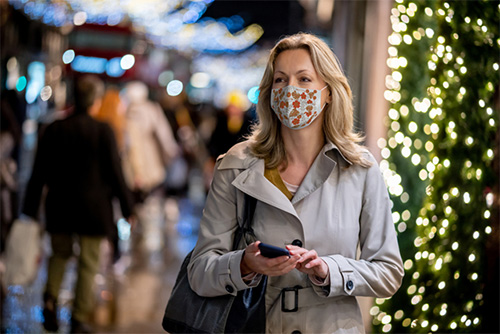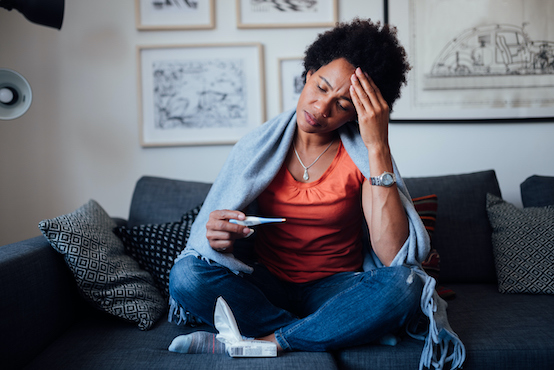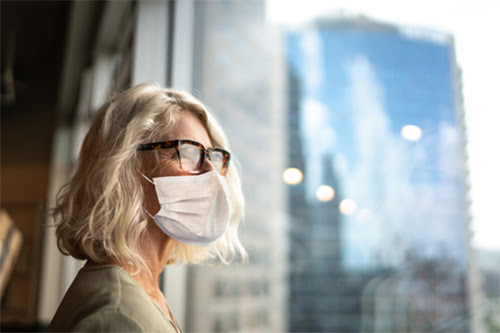By Dr. Pier Boutin, MD
We’ve all heard stories about people having flu-like symptoms after getting their Covid vaccine. And those stories are clearly true — lots of people have to take a couple of days off, especially after their second shot.
That’s given rise to lots of worries — even your worst fears. Those worries have kept many people from getting the vaccine.
Should you be worried? Let’s have a look at the facts.

Reactions and who’s having them
About 80-90% of people report a reaction to the Covid vaccine. The vast majority are harmless and mild. For many, the reactions are inconvenient or uncomfortable. The most serious reactions are so rare it’s hard to attribute them to the virus.
Here’s an infographic that explains:
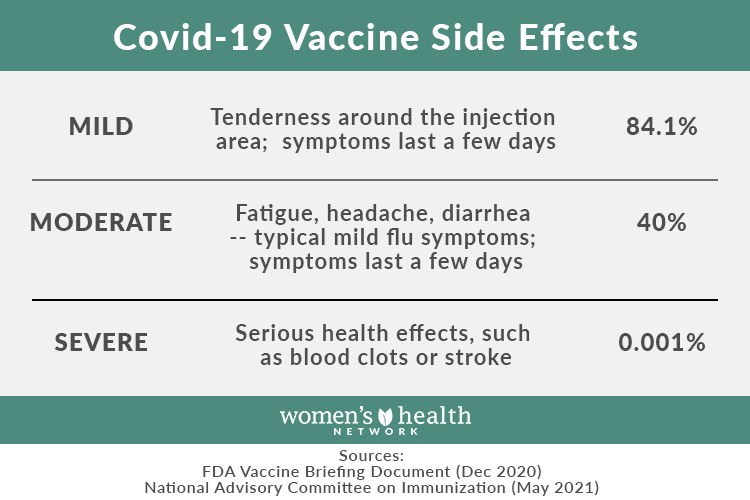
What’s most interesting about the data is who is having these reactions: the victims are overwhelmingly women:
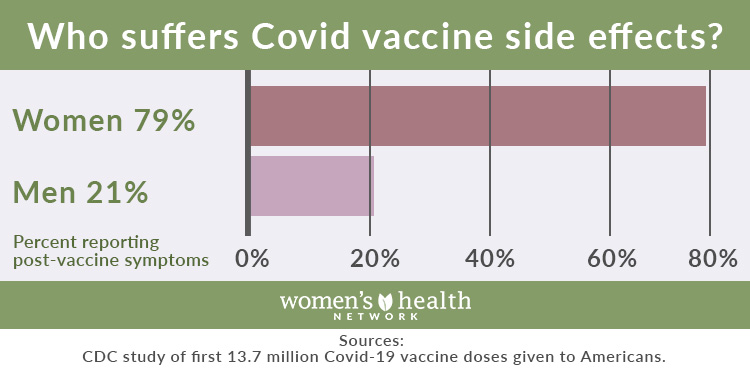
Should you be worried about these side effects? Are side effects a bad sign or a good sign? Are your worst fears possible? Let’s take each question in turn, starting with the basic science: why do some people have side effects and others don’t?
What explains the data?
A little science will make everything clear.
Your immune system consists of two basic parts — the innate and the adaptive. The innate part is a kind of standing army guarding the borders. The adaptive part is called up with a response that is targeted to the specific threat.
Vaccines work by training the adaptive part to recognize a pathogen and respond to it. That “memory” is what conveys long-term immunity.
But the innate system may also recognize the vaccine as a pathogen and fight back. So you may have two reactions to the vaccine as your body fights the pseudo-pathogen.
Now, if you’re exposed to the real pathogen later, your body’s counterattack is much faster and more effective — which means you win and the pathogen loses.
One more point. The innate immune system is stronger in women than in men. Much stronger.
Now the data on Covid vaccine reactions becomes clear. The reactions we see are both the innate and adaptive responses. Women are more likely to have these reactions than men because women’s innate immune response is generally much stronger. (This may also help to explain why so many women experience “long Covid” symptoms.)
This still leaves several questions, however — all about our worries. Let’s take them one by one.
Is a strong reaction a good or bad thing?
Having a mild reaction is a good thing — it means your body has recognized the pseudo-pathogen of the vaccine, and that makes it more likely that your adaptive immune system is making a “memory” to improve your future response to the real pathogen.
But the converse is not true — not having a reaction is not necessarily a bad thing. It may only mean your innate immune system isn’t over-reacting.
Is it worrisome that women have such reactions?
Not really. Women have always had stronger reactions than men to vaccines — not just Covid vaccines.
It’s long been known that women tend to have stronger reactions to immunization shots than men do — no matter which vaccine is administered!
In a 2013 study, for example, researchers with the CDC and other institutions found that, while rare, four times as many women as men between the ages of 20 and 59 reported allergic reactions after receiving the flu vaccine. Another study found that between 1990 and 2016, women accounted for 80 percent of the small percentage of people who experienced severe allergic reactions to vaccines.
Even among shots given in infancy and early childhood, females are more likely to experience reactions to hepatitis B and measles, mumps and rubella (MMR) vaccines compared to males.
So this is no reason to scare women away from having the Covid vaccine — that’s just bad science.
Why is immune response so different in women?
We don’t really know why the innate immune response in so much stronger in women than in men. Several biological and genetic factors appear to be in play.
One factor could be related to reproductive hormone levels. Sex hormones including estrogen, progesterone and testosterone can bind to the surface of immune cells, influencing how they work. According to researchers, exposure to the female sex hormone estrogen may cause immune cells to produce more antibodies in response to the flu vaccine. On the flip side, the main male sex hormone testosterone is more immunosuppressive, meaning it dampens the immune response.
This could help to partially explain why the flu vaccine tends to be less protective in men with higher testosterone levels compared with men with less of the sex hormone.
Genetics is also a factor in influencing immunity in women vs. men. Many immune-related genes are on the X chromosome, of which females have two copies (XX) and males have only one (XY). Geneticists once believed that only one X chromosome was “turned on” for immunity in women, with the other X chromosome left inactive. However, new research shows that 15 percent of genes escape this inactivation — essentially giving women a 15 percent more powerful immune system than men!
What does this all mean? Perhaps only that that humans have simply evolved so that women have a stronger immune response — and therefore it is somehow favorable.
Your worst fear: the Covid vaccine cause death
The data say that this is not a realistic fear. Most of the vaccines in the USA are so safe that the risks of death are almost too small to measure. The Astra Zeneca vaccine, which has not been licensed in the USA, has the most questions about its safety. Even there, the few deaths among those who’ve taken it can’t be attributed to the vaccine.
It’s possible all of those fatalities were normal — while it’s rare, young people do die of stroke and blood clots without having a vaccine cause it. Even if all such deaths were caused by the vaccine — which is implausible — it would only be a risk of about 1 in 500,000. Your odds of dying of Covid are much higher than that.
The risks of the Johnson & Johnson vaccine are even lower than for the Astra Zeneca vaccine. The restrictions on use in young women have been made simply out of an abundance of caution.
Please remember that when our thinking is driven by our emotions we lose perspective. Your odds of dying in a car crash are about 1 in 103. If your odds of dying from a Covid vaccine are 1 in 500,000, that’s 5,000 times safer than driving a car. By contrast, your odds of dying of Covid are more like 1 in 200. So the rational thing to do is get the vaccine!
Your next worst fear: getting Covid from the vaccine
Actually, this is not possible. None of the Covid vaccines available in the USA use the real CoV-2 virus. The Pfizer and Moderna vaccines use mRNA technology, which does not utilize the virus itself. The J&J vaccine uses viral vector technology, which also does not contain the virus itself.
The fears about getting Covid from a vaccine are based on two misunderstandings. First, older vaccines, such as the one for polio, used attenuated or deactivated live virus. The attenuated method weakened the live virus so it was less likely to cause infection, but there was a slight risk of it doing so. The deactivated method destroyed the viral DNA so it could not replicate, but quality control problems were possible, yielding a theoretical risk of infection. But neither of these methods is used in current Covid vaccines.
The second misunderstanding is that the reactions people experience to Covid vaccines are a sign of a “live” infection. They are not. The body’s reaction is real enough — but the trigger is not a live virus. That’s part of the genius of modern vaccine technology.
We hope this helps you keep perspective on getting a Covid vaccination. In our view, these are vaccines at their best: a safe protection against a very real risk. There have never been vaccines so effective and so well-studied. And on the other side of this vaccination campaign we should be able to get back to normal life. Won’t that be wonderful?








